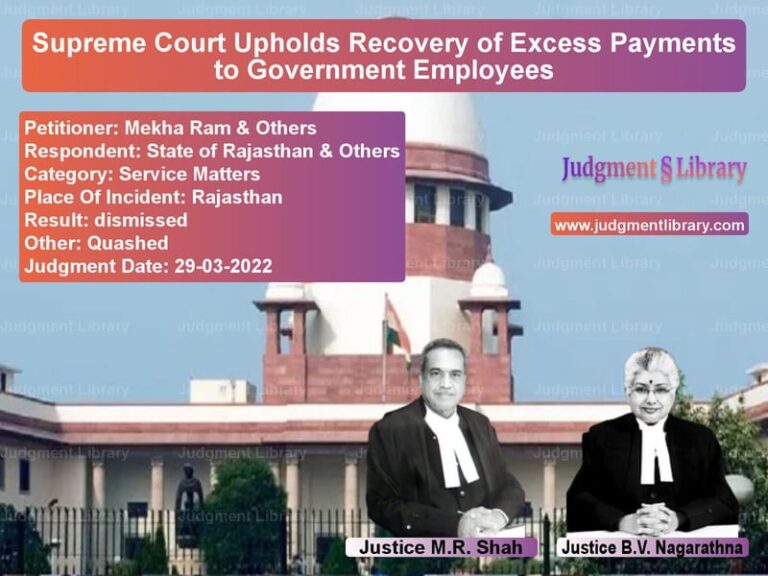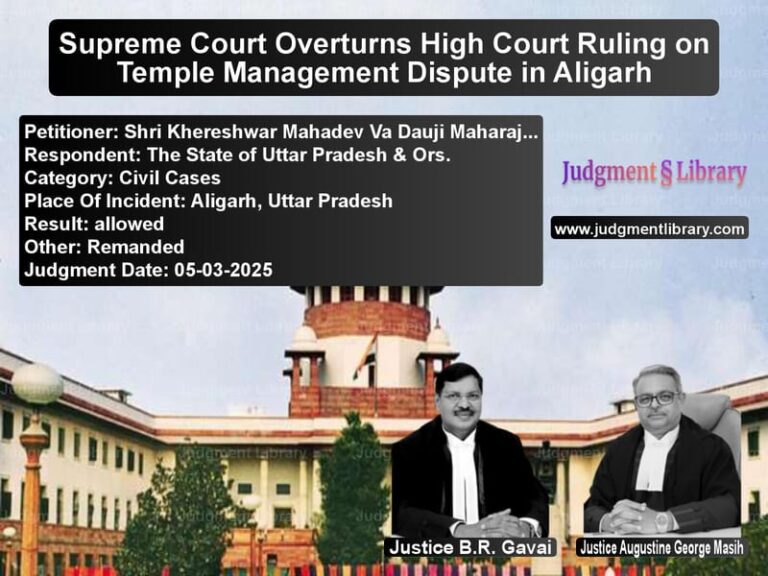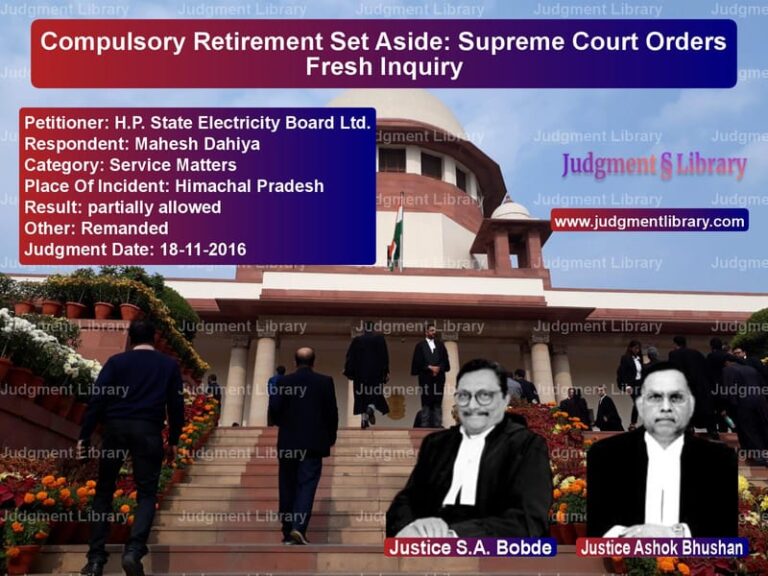Forest Land Compensation Case: Supreme Court Decision on Kerala Forest Dispute
The case of The Conservator and Custodian of Forest & Ors. v. Sobha John Koshy & Anr. presents a significant legal dispute concerning land rights, government acquisition, and compensation claims. The Supreme Court had to determine whether the landowners, who were deprived of possession of their land due to wrongful vesting under the Kerala Private Forest (Vesting and Assignment) Act, 1971, were entitled to compensation despite the subsequent classification of the land as ecologically fragile under the Kerala Forest (Vesting and Management of Ecologically Fragile Lands) Act, 2003.
The appeal was filed by the Conservator and Custodian of Forest against the Kerala High Court’s decision directing the State to pay compensation to the landowners after it failed to restore their land. The dispute dates back to the 1970s, and after prolonged litigation, the Supreme Court delivered its judgment on February 10, 2021.
Case Background
The respondents, Sobha John Koshy and others, had filed a claim before the Forest Tribunal under Section 8 of the Kerala Private Forest (Vesting and Assignment) Act, 1971, asserting that their land was not vested forest land. The Tribunal ruled against them, but after multiple appeals, the Kerala High Court eventually ruled in favor of the landowners, stating that their land was exempt from the vesting provisions of the Act.
Despite this ruling, the land was not restored to them due to various reasons, including occupation by Adivasis and administrative delays. Subsequently, the land was notified as an ecologically fragile land under the Kerala Forest (Vesting and Management of Ecologically Fragile Lands) Act, 2003, leading to the State’s refusal to return the land or compensate the owners.
Arguments by the Petitioner (State Authorities)
The appellants, represented by the Conservator of Forests and other State authorities, made the following key arguments:
- The land had already been classified as ecologically fragile land under the Kerala Forest (Vesting and Management of Ecologically Fragile Lands) Act, 2003, which meant that no compensation was payable as per Section 8(2) of the Act.
- A notification had been issued under Section 3 of the Act in 2007, confirming the vesting of the land with the government, thereby extinguishing any private ownership rights.
- The delay in returning the land was due to Adivasi occupations, for which the government had already issued orders preventing their eviction.
- Since the land had legally vested with the government, the respondents were not entitled to any compensation under the Act of 2003.
Arguments by the Respondent (Landowners)
The respondents argued the following:
- Their right to possession had been confirmed by a 1998 Kerala High Court judgment, which stated that the land was wrongly considered vested under the 1971 Act.
- Their land was cultivated with cardamom and pepper, and did not qualify as ecologically fragile land under the 2003 Act.
- The government’s failure to restore the land was in violation of Section 8(3) of the 1971 Act, which required restoration once the vesting claim was dismissed.
- They were deprived of their land for over 45 years and should be compensated for the loss of use and potential revenue from the land.
Supreme Court’s Analysis
The Supreme Court analyzed whether the respondents were entitled to compensation despite the government’s claim that the land had vested under the 2003 Act. The Court made the following observations:
- The 1998 Kerala High Court judgment had already confirmed that the landowners were entitled to restoration of their land.
- The government failed to comply with its duty under Section 8 of the 1971 Act to restore the land.
- The classification of the land as ecologically fragile under the 2003 Act did not negate the fact that the landowners were deprived of their rights for decades.
- Even if full compensation for the land was not payable, the landowners were entitled to compensation for the period they were wrongfully kept out of possession.
Final Judgment
The Supreme Court modified the Kerala High Court’s ruling and partially allowed the appeal. The Court held that:
- The respondents would not receive full compensation for the land since it was now classified as ecologically fragile land.
- However, the respondents were entitled to 50% of the compensation as assessed by the Tehsildar, for the period they were deprived of their land.
- The compensation amount was to be paid within three months, failing which it would accrue interest at 7% per annum.
Legal Significance
This case underscores important legal principles regarding government land acquisitions, private land rights, and compensation:
- Government agencies must comply with court orders regarding land restoration and cannot indefinitely delay compliance.
- Even when land is subsequently classified as ecologically protected, prior violations of landowners’ rights may still warrant compensation.
- Courts seek to balance environmental protection laws with property rights, ensuring that landowners are not unfairly deprived.
The ruling provides a critical precedent for similar cases involving wrongful land acquisition and delayed compliance with court orders.
Petitioner Name: The Conservator and Custodian of Forest & Ors..Respondent Name: Sobha John Koshy & Anr..Judgment By: Justice Ashok Bhushan, Justice R. Subhash Reddy, Justice M.R. Shah.Place Of Incident: Pannu Valley, Wayanad, Kerala.Judgment Date: 10-02-2021.
Don’t miss out on the full details! Download the complete judgment in PDF format below and gain valuable insights instantly!
Download Judgment: the-conservator-and-vs-sobha-john-koshy-&-a-supreme-court-of-india-judgment-dated-10-02-2021.pdf
Directly Download Judgment: Directly download this Judgment
See all petitions in Environmental Cases
See all petitions in Property Disputes
See all petitions in Judgment by Ashok Bhushan
See all petitions in Judgment by R. Subhash Reddy
See all petitions in Judgment by Mukeshkumar Rasikbhai Shah
See all petitions in partially allowed
See all petitions in Modified
See all petitions in supreme court of India judgments February 2021
See all petitions in 2021 judgments
See all posts in Environmental Cases Category
See all allowed petitions in Environmental Cases Category
See all Dismissed petitions in Environmental Cases Category
See all partially allowed petitions in Environmental Cases Category







